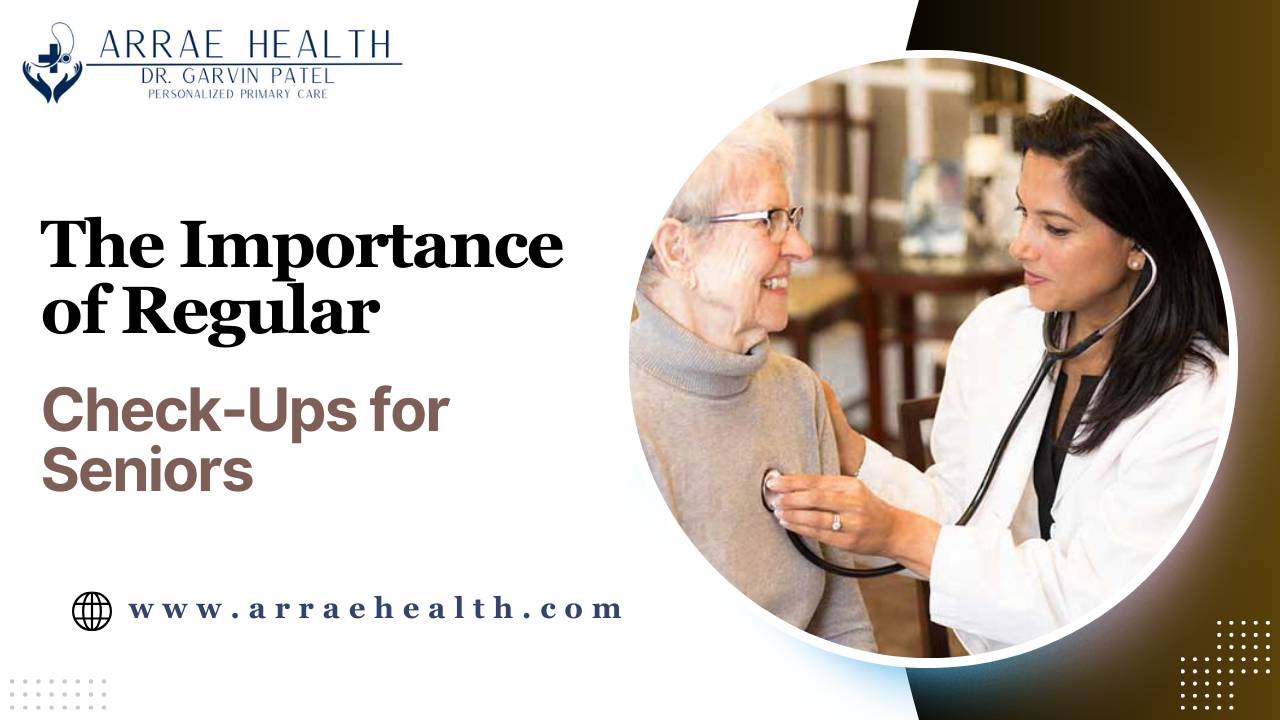Arrae Health: Primary Care Physician | Senior Health Services in Corona & Palm Springs

30 Oct, 2023
The Importance of Regular Check-Ups for Seniors
Regular check-ups are a vital aspect of maintaining good health for seniors. As we age, our bodies undergo various changes, making it even more crucial to stay proactive about our well-being. This blog post will explore the significance of regular check-ups for seniors and how they contribute to a healthier, happier, and more fulfilling life.
Why Seniors Should Prioritize Regular Check-Ups:
Early Detection of Health Issues:
Regular check-ups help identify potential health problems at an early stage. Many age-related conditions, such as diabetes, hypertension, High Blood Pressure and certain cancers, are more manageable when detected early.
Personalized Health Plans:
Seniors benefit from personalized healthcare plans tailored to their unique needs. These plans consider factors like age, medical history, and lifestyle, ensuring they receive the most appropriate care.
Medication Management:
Seniors often take multiple medications. Regular check ups help healthcare providers monitor the effects and interactions of these medications, preventing complications.
Preventive Care:
Regular check-ups allow healthcare professionals to recommend vaccines, screenings, and lifestyle modifications that can prevent diseases, such as flu shots, colonoscopies, and dietary changes.
Chronic Disease Management:
Seniors with chronic conditions like arthritis, heart disease, and osteoporosis require consistent monitoring and management. Regular check ensure these conditions are well-controlled.
Mental Health Assessment:
Mental health is equally important. Check-ups include evaluations for conditions like depression and anxiety, common among seniors, and can provide necessary support and resources.
Nutritional Guidance:
Nutrition plays a significant role in senior health. Regular check may include dietary advice to maintain a balanced, nutrient-rich diet supporting overall well-being.
Physical Activity Recommendations:
Staying active is essential for Senior Health Checkups. Healthcare providers can suggest safe and appropriate exercises to maintain strength and flexibility.
Cognitive Health:
Cognitive health screenings help detect early signs of Alzheimer’s and dementia, allowing for timely interventions and support.
Social Interaction:
Regular check-ups also provide an opportunity for social interaction, combating feelings of isolation that can affect seniors.
Benefits of Regular Check-Ups:
Improved Quality of Life:
Regular check-ups can enhance seniors’ overall quality of life by helping them stay healthy, active, and engaged in their communities.
Longevity:
Regular healthcare monitoring can contribute to a longer, healthier life, enabling seniors to enjoy their golden years.
Peace of Mind:
Knowing that their health is in good hands and that any emerging issues will be addressed promptly can provide seniors with peace of mind.
Cost Savings:
Early detection and prevention are often more cost-effective than treating advanced health conditions. Regular check can save money in the long run.
Choosing a Healthcare Provider for Seniors:
Geriatric Specialists:
Geriatric specialists have expertise in addressing the unique healthcare needs of seniors and can provide specialized care.
Family Doctors:
Many seniors continue to see their family doctors, who comprehensively understand their medical history.
Home Healthcare Services:
For seniors with mobility issues, home healthcare services can bring medical professionals to their homes for regular check-ups.
Medicare Coverage:
Seniors should be aware of Medicare coverage for regular check and explore options for additional health insurance.
